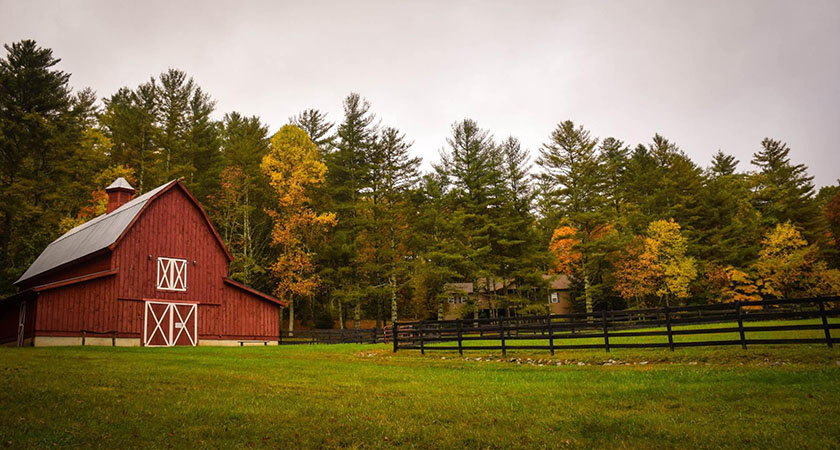A Hunch
By ML Condike

Crunch! Crunch! Crunch!
The fallen leaves broke the silence as I crept into my deer stand at dawn of opening day.
Clouds formed with every breath and the cold air picked at my nose. My fingertips ached as I
cradled my shotgun against my chest.
I’d picked the spot on the old Walker farm after seeing a large buck at the abandoned
property every morning during my scouting excursions. I’d put in the time the whole month
before opening day. Done my homework. I felt lucky this morning.
The crackle and pop of my walkie-talkie startled me. “Polecat to Lorenzo. Are you
situated yet?”
I picked up my pace. Half of us in the hunting gang would stand this morning. “Lorenzo
to Polecat. Almost there.”
“The drive is on. Expect action. Hedgehog spotted a big buck headed your way.”
“Ten-four.” I stuffed my walkie-talkie back into my blaze orange vest, then worked my
way along the field edged by stonewalls. At a corner I followed a wall that cut back into the
woods and ran a hundred yards before it vanished into the detritus.
I stood next to a large red oak and watched for movement.
The other half of the gang would make the drive. They formed a line along a cart road
and began their push into the woods towards the stands. The ‘doggers’ slowly moved toward
those of us on stands. I waited, ready for that big buck to wander into view.
Bang! Bang! Bang! Three shots rang out from Red Fox’s position just off an old logging
road. Bang! Within seconds another shot followed. “Red Fox to Polecat. Got a big doe! Four
more, including a ten-pointer, are headed southwest.”
The human dog pack would adjust to the new direction and try to turn the deer.
Meanwhile, I remained in position. Per my previous agreement, I was to remain there
until the captain called. I stomped the ground and walked around the large oak to keep my feet
warm. After what seemed like hours, I leaned my shotgun against the large oak and settled into a
seat formed by a jutting stone in the centuries-old wall.
Freezing, I watched the sun find its way through the canopy of trees and project a beam
onto a group of fieldstones nestled amongst the leaves. Small white birch trees bent toward the
light. A handful of yellow hangers-on still clung to the tips of a small branch. I watched as the
sun ate away the frost from the edges of a large granite and quartz stone. A haphazard row of
small ragged and broken rocks appeared unnatural, but I fought the urge to investigate and stood
my ground for fear of spooking an unsuspecting deer who might wander into my sights.
A movement at the opposite side of the small clearing caught my eye. A tall, thin African
American man walked slowly behind the opposite wall nearest the deep woods. I watched as the
unarmed man floated through the thickets. He wasn’t wearing hunting clothes or a State-required
blaze-orange vest.
“Good morning. It’s mighty cold,” I said, hoping to get the man’s attention.
The man looked his way, nodded without smiling and continued on.
Not wanting to see the gentleman get mistaken for a deer, I spoke up. “You shouldn’t be
out here without a vest.”
The man looked at me again and nodded before he disappeared into the woods.
“Can’t tell those city slickers anything.” I pulled a candy bar from my pocket and took a
bite while I waited to hear from the hunt captain.
My position hadn’t been obvious to me when I first arrived. I was tucked into a corner
half buried stones formed an elongated diamond-shaped enclosure barely visible. It could have
been a small pen used for animals when the farm operated. The stones I’d noticed earlier sat
directly in the center of the enclosure.
The walkie-talkie interrupted my muse. “Polecat to Lorenzo. Move to home base. Elvis
has left the building.”
“On my way.” I took one last look over the wall, grabbed my Winchester and headed
back to the rendezvous point on the cart road.
After a successful hunt, the gang congregated back at my house for the ritual debriefing
where each of the hunters told a bigger lie than the last. When it came to my turn, I told about
seeing the African American man walking along the wall without a blaze-orange vest.
“We didn’t see signs of any other hunters in the area,” Polecat said.
Red Fox shook his head. “What were you drinking out there? Did you fill your thermos
with something stronger than black coffee?”
All the hunters laughed.
The stories went on for another thirty minutes before the meeting broke up.
After the last hunter left, my wife joined me in the kitchen. “I hope you’re ready for the
historical society meeting,” Lou said. “Remember you promised you’d be there.”
After two shots of Johnnie Walker, I had no interest in leaving the warm house, but I
knew a promise was a promise, so I dragged myself upstairs and changed into street clothes.
The guest speaker of the meeting was none other than my least favorite historian Larry
Butterworth. As far as I knew, Butterworth did all of his historic explorations in front of a
computer. He rarely ventured into the field.
“Thank you for inviting me to speak tonight,” Mr. Butterworth began.
“Who invited him?” I whispered to Lou.
Her eyes shot daggers as she put her finger to her lips.
I rolled my eyes.
“My topic this evening is lost cemeteries. Even in our small community there are at least
three lost cemeteries. The most infamous is that of Prince Walker.
“Prince Walker, the son of a slave owned by James Caldwell, was promised freedom
when he reached age twenty-five. Unfortunately, at age ten, fate intervened. He and his father
fell victim to a violent storm that killed his father. The boy was sent to work on the Jennison
farm. The wealthy farmer refused to honor Caldwell’s promise so at age twenty-one Prince
Walker left without permission to work on the Caldwell farm.
“Angry, Jennison deployed his men to the Caldwell farm where they abducted Walker
and chained him in a local sawmill. The Caldwell brothers found him and took him home. Years
of court battles ultimately resulted in Walker’s freedom. Jennison was found guilty of assault.
Some historians say this case abolished slavery in the Bay State. Prince Walker married and
raised a family on the Caldwell farm. Even as a free man, the white Protestants refused him
burial in consecrated ground, so a small area on the Walker farm became their resting place.”
Butterworth hesitated and took a sip of water before continuing. “I’ve personally hunted
for the site without success.”
I straightened in my chair. I’d been hunting on the old Walker farm this morning. Vivid
images of the white birches growing amongst boulders and lichen-covered rocks came to mind
along with the apparition of the black man. I leaned over to Lou and whispered, “I think I know
where it is.”
She rolled her eyes and shushed me.
Butterworth droned on about lost cemeteries, but my mind wondered to my hunting spot.
“Are there any questions?” Butterworth asked.
“I have one.” I said.
Butterworth glared at me. I’d ambushed at other meetings. “Yes?”
“Have you ever hiked across Bea Riley’s fields toward Fisher Road?”
Butterworth squirmed. “I’ve driven up Fisher Road several times. Why?”
“To the old Walker farm?” I asked.
“Yes. To the cellar hole at the site of the main house.” Butterworth stuck out his chest.
“Great. I’ll meet you there tomorrow morning at nine and show you the Prince Walker
family cemetery.” Lorenzo grinned.
“What makes you think you know where it?” Butterworth asked.
“Oh, just call it a hunch.”
